The Children’s West
Children tread lightly through the pages of Old West history. Pintsized Pioneers: Taming the Frontier, One Chore at a Time gives frontier children their due for all the work they did to assist their families. Even at early ages, the youngsters helped families make ends meet and handled chores that today seem unbelievable. Written for today’s young adults, Pintsized Pioneers offers lessons on frontier history and on the value of work for contemporary youth.
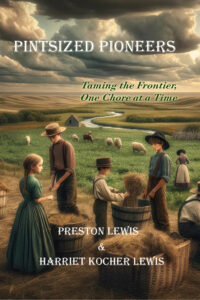 In 1850 adolescents 16 and under accounted for 46 percent of the national population, making them an important labor force in settling the country. Pintsized Pioneers examines their tasks and toils starting with the chores on the trail west. Children assisted in providing fuel and water on the trail and at home when they settled down. In their new locations the young ones helped grow food, make clothing for the entire family and assist with the housekeeping in primitive dwellings.
In 1850 adolescents 16 and under accounted for 46 percent of the national population, making them an important labor force in settling the country. Pintsized Pioneers examines their tasks and toils starting with the chores on the trail west. Children assisted in providing fuel and water on the trail and at home when they settled down. In their new locations the young ones helped grow food, make clothing for the entire family and assist with the housekeeping in primitive dwellings.
These pintsized pioneers took on farm and ranch chores as young as six, some going on cattle drives at eight years of age. Even Old West town tykes, who enjoyed more career possibilities, helped their folks survive as well. In the end, many pintsized pioneers pitched in to help their families make ends meet. Difficult as their lives might have been, the lessons those children learned handling chores helped them and their country in the years ahead. Those pintsized lessons have contemporary applications to the youth of today.
Targeted at young adults, Pintsized Pioneers is written at a ninth-grade reading level and includes a supplementary glossary. Even so, Pintsized Pioneers is an eye-opener for adult readers as well.
The Cat-astrophic Old West
No animal in the Old West was more revered nor more reviled than the domestic cat. Sought for their rodent control, but despised for their nocturnal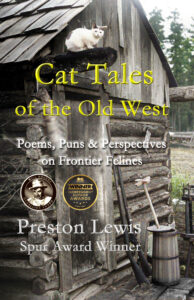 noisemaking, cats lived a schizophrenic existence on the American frontier. In Cat Tales of the Old West Spur Award-winning author Preston Lewis brings frontier felines into the light of the 21st century with a collection of amusing and eclectic excerpts from dozens of 19th century frontier newspapers reporting on pussycats west of the Mississippi River.
noisemaking, cats lived a schizophrenic existence on the American frontier. In Cat Tales of the Old West Spur Award-winning author Preston Lewis brings frontier felines into the light of the 21st century with a collection of amusing and eclectic excerpts from dozens of 19th century frontier newspapers reporting on pussycats west of the Mississippi River.
Through a selection of poems, puns and articles from period news journals, Cat Tales of the Old West provides an entertaining, enlightening and sometimes alarming take on kitties, both feral and domestic, in the American West. The 24,000-word Cat Tales highlights cats as noisemakers, victims of violence, value lessons for children, sources of fable and history, and topics of humor. Cat Tales of the Old West is both engaging and educational for lovers of cats and Old West history.
Old West Feline Hiss-tory
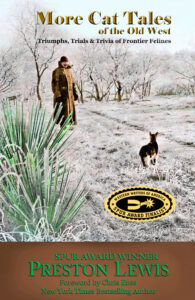 In More Cat Tales of the Old West: Triumphs, Trials & Trivia of Frontier Felines, two-time Spur Award recipient Preston Lewis pulls together another amusing and eclectic collection of articles from western newspapers reports on frontier cats. In the sequel to his award-winning Cat Tales of the Old West: Poems, Puns & Perspectives on Frontier Felines, Lewis provides another engaging look at frontier felines from the perspective of pioneering times.
In More Cat Tales of the Old West: Triumphs, Trials & Trivia of Frontier Felines, two-time Spur Award recipient Preston Lewis pulls together another amusing and eclectic collection of articles from western newspapers reports on frontier cats. In the sequel to his award-winning Cat Tales of the Old West: Poems, Puns & Perspectives on Frontier Felines, Lewis provides another engaging look at frontier felines from the perspective of pioneering times.
In More Cat Tales of the Old West, Lewis examines cats as frontier fighters, homebodies, workers, miners, criminals, and actors with enough colorful period anecdotes to satisfy both the cat lover and the cat hater. With a foreword by New York Times bestselling author Chris Enss, More Cat Tales of the Old West provides an educational perspective on Old West history.
Lewis has been called the greatest living authority on cats in the Old West with articles on the subject in periodicals such as Wild West and Journal of the Wild West History Assocation. The 32,000-word More Cat Tales of the Old West was named a Spur Finalist by Western Writers of America and is catnip for feline fans and frontier aficionados interested in frontier history with a twist of the cat’s tail.
Racing to Survive
As a popular pastime on the American frontier, horse racing could always draw a crowd to admire and bet on horseflesh. Realizing its appeal, boosters of the nascent West Texas community of San Angelo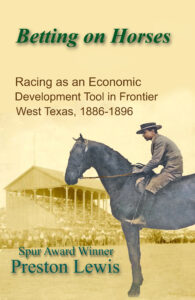 used horse racing to attract investors and settlers and to distance themselves from competing communities in the Concho Valley.
used horse racing to attract investors and settlers and to distance themselves from competing communities in the Concho Valley.
Betting on Horses: Racing as an Economic Development Tool in Frontier West Texas, 1886-1896, explores how San Angelo promoters incorporated racing into their boosterism, sending local horses across the nation and broadening the community’s national exposure and reputation. Betting on Horses is the story of one frontier town’s efforts to survive and thrive as it vied with competitors for the telegraph, for the railroad, for exposure that would attract investors and for its long-term survival.
Too, it’s the story of Concho Valley racehorses like Belle P, Get There, Hal Fisher and Viola Belle, who raced on tracks from San Francisco to New York and from Chicago to New Orleans. Most famous of all the San Angelo racers was Charley Wilson, the star-crossed chestnut with the gigantic stride that beat fabled California mare Geraldine in two out of three races but was later tarnished in a cheating scandal. Betting on Horses offers a fresh look at the role of horses in frontier life and boosterism.
The Cotton Culture
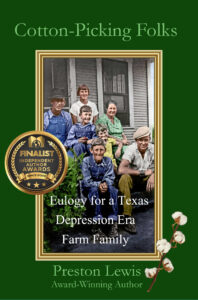 Cotton—like the families that produced it—is today undervalued for its contribution to Texas’s wealth and heritage, but for the region’s first century as a colony, a nation and then a state, the fluffy commodity carried the Lone Star economy bale by bale toward prosperity. In Cotton-Picking Folks, award-winning author of fiction and nonfiction Preston Lewis explores one family’s experiences on dryland tenant farms during the Great Depression and the waning years of the sharecropping and crop lien system.
Cotton—like the families that produced it—is today undervalued for its contribution to Texas’s wealth and heritage, but for the region’s first century as a colony, a nation and then a state, the fluffy commodity carried the Lone Star economy bale by bale toward prosperity. In Cotton-Picking Folks, award-winning author of fiction and nonfiction Preston Lewis explores one family’s experiences on dryland tenant farms during the Great Depression and the waning years of the sharecropping and crop lien system.
As the grandson of a tenant farmer, Lewis in the 1970s collected the written and oral histories of his grandfather’s five daughters and two sons. Born into a poverty that demanded their child labor, all seven siblings picked cotton before they could read, and all faced a biscuit-and-gravy existence that typified the farm tenancy system in the cotton South in the first five decades of the twentieth century. The seven matured as tenant farming reached its Texas zenith in a labor-intensive industry that sucked children into the state’s cotton fields to feed the voracious global hunger for the versatile fiber.
Their coming-of-age recollections are enlightening and touching testaments to the enduring spirit and faith of the Greatest Generation, whose work in the cotton fields was little different than it had been the previous century. In the 78,000-word volume, Lewis provides a 16,000-word essay that puts the Depression-era cotton culture in perspective, then lets those who worked in the fields and farm homes tell their stories through their letters and recollections. Cotton-Picking Folks is a heartfelt tribute to a farm generation poor in material goods but rich in spirit.
Call to Duty
The greatest conflict in human history started brothers Ray F. and John B. Lewis on a journey that they never imagined as farm boys picking cotton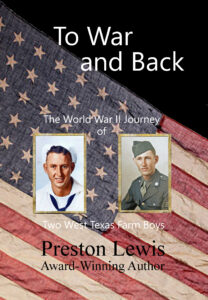 in the dusty fields of West Texas during the Great Depression. World War II took them across the Atlantic to places they had only read about in books or seen on movie screens when they could afford theater tickets. By the time they returned to the States, they had lost their country-boy naivete.
in the dusty fields of West Texas during the Great Depression. World War II took them across the Atlantic to places they had only read about in books or seen on movie screens when they could afford theater tickets. By the time they returned to the States, they had lost their country-boy naivete.
In To War and Back: The World War II Journey of Two West Texas Farm Boys, award-winning author of fiction and nonfiction Preston Lewis explores the wartime exploits of his uncle Ray and his father John. Ray saw combat in the 552nd Anti-Aircraft Artillery Battalion, but John never heard a shot fired in anger while a merchant mariner at the end of the conflict.
To War and Back is the sequel to Cotton-Picking Folks: Eulogy for a Texas Depression Era Farm Family. Enthralled by his family’s stories of West Texas life in the 1930s and 1940s, Lewis in the 1970s collected the written and oral histories of his grandfather’s five daughters and two sons. Fascinated by his uncle’s and father’s accounts of World War II, he extracted them from those oral histories and added background and context on their European adventures, some sad, many poignant and others humorous.
Ray and John were both bit players in the events of the war, although John rides to the rescue of a downed Women Airforce Service Pilot as an anonymous cowboy in several books on female aviation history. Even though they played minor roles in the war, their stories provide a glimpse into tough times by men committed to serving their country.
The 44,000-word memoir provides a poignant glimpse into the lives of two brothers of the Greatest Generation. With only an estimated 300,000 WWII veterans remaining in the United States, the living memory of World War II is gradually fading away. To War and Back: The World War II Journey of Two West Texas Farm Boys saves for posterity the stories of these two young men who grew to maturity during the troubled war years.
Does AI Have Faith?
 With the release of OpenAI making ChatGPT available to the public in 2022, the authors wondered how a soulless machine would interpret biblical verses. Would the results from a godless computer be derogatory or supportive of their Christian beliefs? Using some of the most beloved verses as well as several of the more disturbing passages from the Bible, Preston and Harriet Lewis began a faith journey through artificial intelligence that provided surprising results.
With the release of OpenAI making ChatGPT available to the public in 2022, the authors wondered how a soulless machine would interpret biblical verses. Would the results from a godless computer be derogatory or supportive of their Christian beliefs? Using some of the most beloved verses as well as several of the more disturbing passages from the Bible, Preston and Harriet Lewis began a faith journey through artificial intelligence that provided surprising results.
Devotionals from a Soulless Machine: A Journey of Faith through Artificial Intelligence takes the reader along as these two laypersons explore how A.I. interprets God’s message and the basic tenets of Christianity. The co-authors prompted ChatGPT to develop a devotional of 500 words or less along with a related prayer on more than a hundred biblical verses, including some of the most-recognized verses as well as some of the most obscure or vile passages never covered in Sunday school lessons.
The exercise presented fascinating and sensitive devotionals that lined up comfortably with Christian values and beliefs. On occasion ChatGPT declined to produce a devotional, noting the selected passage contained language difficult to interpret in a positive light, violating its aim of promoting positivity, love, and understanding.
This couple’s journey of faith resulted in 82,000 words of devotionals and reflections. In the end the exercise provided the authors with some reassurances about how artificial intelligence can support religious growth as well as raising questions about the technology’s long-term implications for the religious experience. Devotionals from a Soulless Machine: A Journey of Faith through Artificial Intelligence provides an eye-opening look into the majesty of Christian convictions, even in the age of algorithms and chatbots.
Does AI Have a Sense of Humor?
Jokes from a Humorless Machine: A Comedic Journey through Artificial Intelligence explores whether AI, specifically ChatGPT, has enough of a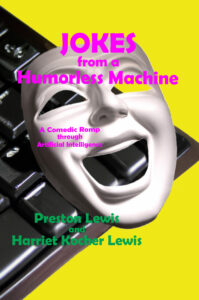 sense of humor to create jokes that will tickle the funny bone of contemporary Americans. Through a series of prompts, the authors ask ChatGPT to develop jokes on classic themes as well as contemporary issues with surprising results, all demonstrating AI’s sense of humor as shaped by its algorithmic woke sensibilities.
sense of humor to create jokes that will tickle the funny bone of contemporary Americans. Through a series of prompts, the authors ask ChatGPT to develop jokes on classic themes as well as contemporary issues with surprising results, all demonstrating AI’s sense of humor as shaped by its algorithmic woke sensibilities.
Preston Lewis, an award-winning humorist, and Harriet Kocher Lewis, his award-winning editor, challenge ChatGPT to humor them with a series of prompts to develop jokes on classic themes like knock-knock, yo mama, three fellows enter a bar and the reason the chicken crossed the road.
Then the authors move on to more contemporary issues like politics, politicians and gender identify, challenging ChatGPT to find humor in modern culture. Finally, the authors seek from ChatGPT observations on contemporary culture in the style of several American humorists and more recent comedians.
In the process, the authors not only touch on the history of classic comedic memes but also discover biases in the resulting AI output. Are the jokes sensitive? Absolutely! Are they politically correct? Without a doubt! Are the jokes funny? The reader will decide.
Does AI Have Taste?
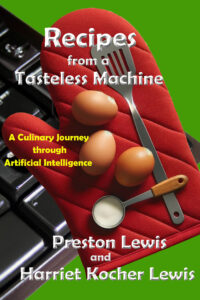 In Recipes from a Tasteless Machine: A Culinary Journey through Artificial Intelligence the authors put ChatGPT to the taste test, challenging it to develop delicious recipes on a variety of themes. The result provides an amusing mix of recipes and a fascinating look into how artificial intelligence thinks in the kitchen.
In Recipes from a Tasteless Machine: A Culinary Journey through Artificial Intelligence the authors put ChatGPT to the taste test, challenging it to develop delicious recipes on a variety of themes. The result provides an amusing mix of recipes and a fascinating look into how artificial intelligence thinks in the kitchen.
Recipes from a Tasteless Machine is the third book in the Magic Machine Series from award winning authors Preston Lewis and Harriet Kocher Lewis. The book organizes recipes around themes based on the months of the year and related holidays. From breakfast meals in January all the way to holiday fare at the end of the year, the authors provide a culinary calendar of mostly delectable dishes that’ll bring a smile to the face if not to the tastebuds.
New Year’s Day recipes cover breakfast, pastries and brunch while February focuses on candies, cookies and cakes in celebration of Valentine’s Day. March and St. Patrick’s Day provide offerings on salads and beverages while April Fool’s Day explores whimsical foods. Ethnic foods are covered in May with Cinco de Mayo and Mexican food and in June with Juneteenth recipes celebrating African-American and Southern foods.
Fourth of July recipes look at American fare like hamburgers, hot dogs and ice cream. Box lunches are explored in August in celebration of the start of school while Labor Day dishes explore comfort food and casseroles. For October Columbus Day dishes include Italian and indigenous people’s foods. November covers holiday dishes while December and Winter Solstice are celebrated with soups stews and chilis.
The authors offer a baker’s dozen of chapters with a thirteenth holiday they call “Family Day” to celebrate some of their tried-and-true family recipes and the stories behind them. All in all, Recipes from a Tasteless Machine provides a variety of recipes and food trivia to satisfy any taste. As the French, would say “Bon appétit,” though the authors note that since the recipes were developed by artificial intelligence the French might also say “Mangez à vos risques et perils!”
